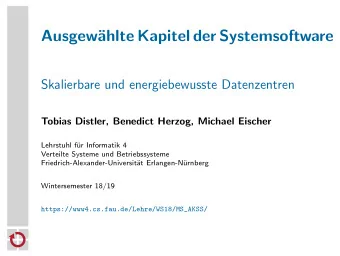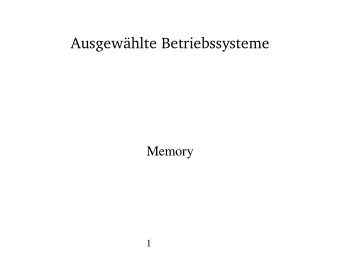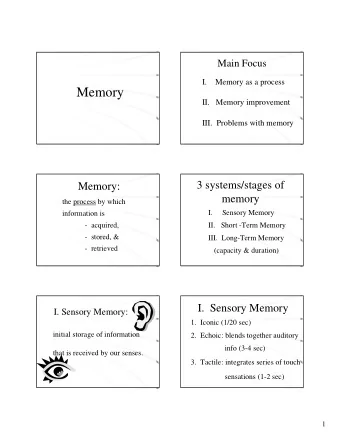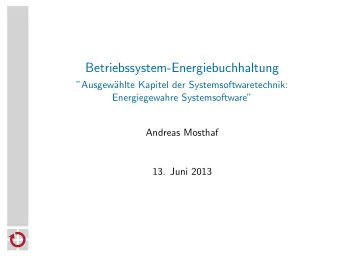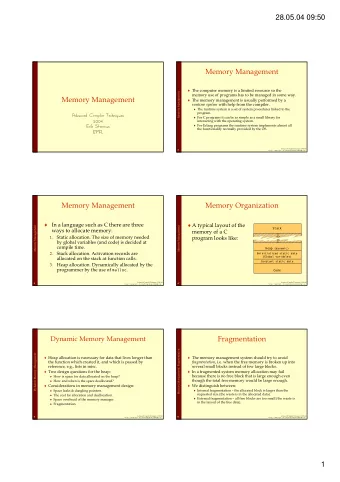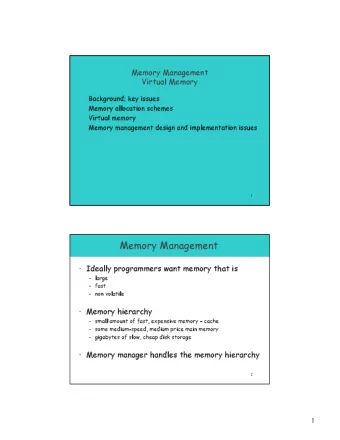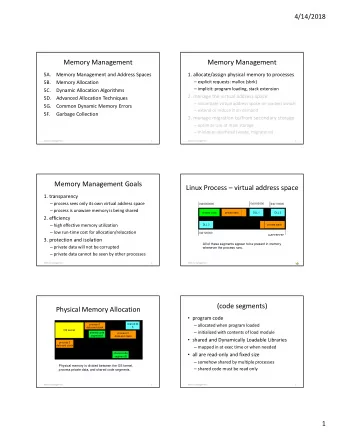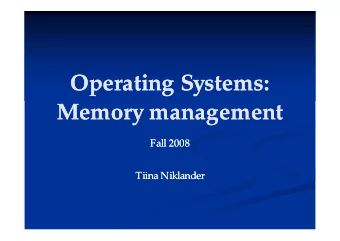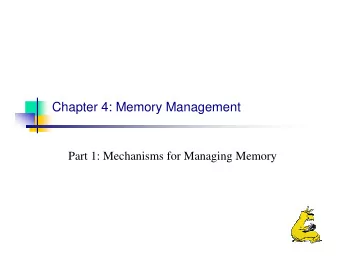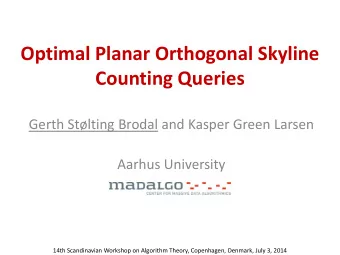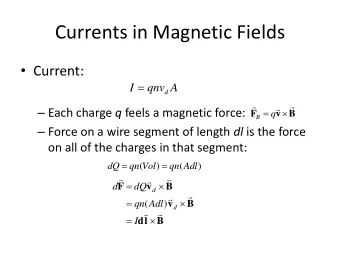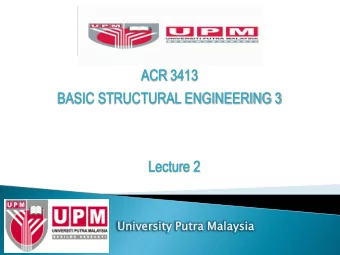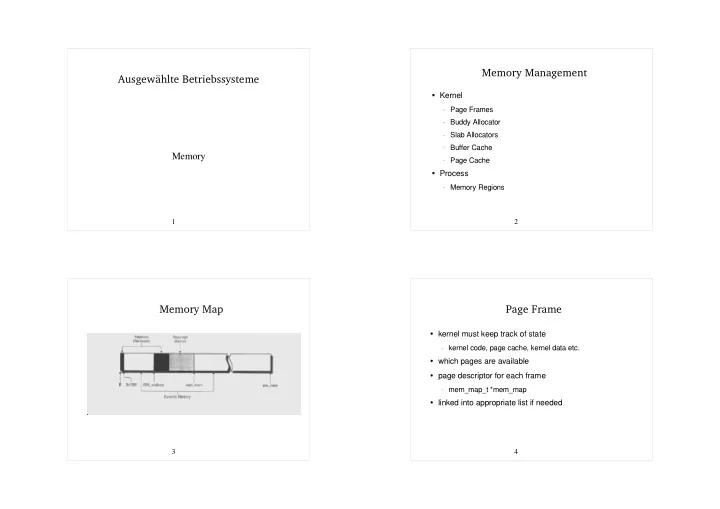
Memory Management Ausgewhlte Betriebssysteme Kernel Page Frames - PowerPoint PPT Presentation
Memory Management Ausgewhlte Betriebssysteme Kernel Page Frames Buddy Allocator Slab Allocators Buffer Cache Memory Page Cache Process Memory Regions 1 2 Memory Map Page Frame kernel
� � � � � � Memory Management Ausgewählte Betriebssysteme Kernel – Page Frames – Buddy Allocator – Slab Allocators – Buffer Cache Memory – Page Cache Process – Memory Regions 1 2 Memory Map Page Frame kernel must keep track of state – kernel code, page cache, kernel data etc. which pages are available page descriptor for each frame – mem_map_t *mem_map linked into appropriate list if needed 3 4
� � � � � � � � Buddy Why not paging robust, efficient kernel allocator sometimes physical contiguous pages required – DMA bypasses CPU paging circuitry contiguous page frames paging modification deteriorate TLB efficiency external fragmentation – TLB flushing required for consistency – paging – managing pages in a suitable way 5 6 Buddy Allocator Buddy in action well-known buddy system algorithm free pages are grouped into 10 lists – 1 .. 512 contiguous pages apropriately aligned 7 8
� � � � � � � � � � � � � Memory Area Management Buddy API contiguous physical addresses arbitrary length (not necessarily multiple of page size) get_free_page(pfp_mask); – feq tens or hundreds of bytes __get_free_pages(gfp_mask,order); internal fragmentation free_page(addr); 2.0 buddies for small requests free_pages(addr,order); – geometrically distributed size – not more than 50 % loss 2.2 Slab Allocator – first 1994 Solaris 2.4 9 10 Slab Slab memory areas as objects if size not geometrically distributed, addresses are less prone to concentrate on physical addresses whose – set of data structures values are power of 2 – constructor and destructor – better hardware cache usage – not used in Linux frequent calls to the buddy allocator pollutes the cache tendency of requesting and releasing same memory type repeatedly – e.g. process creation – keep memory in cache as long as possible 11 12
� � � � � � � � Caches Cache object of same kind are stored in caches – e.g. file object upon open system call is stored in cache filp (file pointer) – /proc/slabinfo consist of several slabs – each slab consist of one or more contiguous page frames 13 14 Caches and Slabs General and Specific Caches general used only be the slab allocator for own purposses cache descriptors ( cache_cache) slab descriptors ( cache_slabp ) 13 caches for geometrically distributed memory areas kmem_cache_init() ,kmem_cache_sizes_init() – specific kmem_cache_create() – 15 16
� � � � � � � Slabs and Objects Noncontiguous Memory rarely used only for (hopefully) infrequent changed objects – data structures for active swap areas – space for modules – buffers for some I/O drivers 17 18 Noncontiguous Memory Linux 2.4 and Memory vmalloc Buddies – 2.2 has two buddy systems (DMA and Non-DMA) vfree – 2.4 adds a third for high physical memory Slabs – mostly unchanged – slab caches can be destroyed modules are expected to do so 19 20
� � � � � � � Process Address Space Memory Regions non-urgent – allocation does not mean access addressing errors must be caught set of linear address – memory region different access rights different for each process no relation among processes 21 22 Memory Regions MM related system calls – brk Situations for new regions – execve – process creation – exit – exec – fork – memory map – mmap – stack growth – munmap – IPC shared memory – shmat – expand dynamic area (heap) – shmdt 23 24
� � � � � � � � � � � � � � � � � Memory Descriptor Memory Region pointer to regions list vm_area_struct pointer to Global Directory start of region number of allocated pages end of region address space size access rights reference count all regions of a process are linked possibly shared among lightweight processes 25 26 Changing Memory Regions Memory Region (2) find_vma() find_vma_intersection() get_unmapped_area() insert_vm_struct() do_map() do_unmap() 27 28
� � � � � Page Faults Page Fault programming errors handle_mm_fault() – allocates new pages missing page, though linear address belongs to the process address space – demand paging – contained in some memory region do_no_page – vma->vm_ops->nopage handler loads page from disk – not invalid from process point of view – do_anonymous_page() – allocate page frame and have process continue do_swap_page 29 30 Page Fault (2) Page Faults image from p. 217 31 32
� � � � � � � � � � � � � � Copy On Write Creating clone(), fork(), vfork() share pages copy_mm() duplicate on modification attempts – copy_segments() – new_page_tables() handle_pte_fault() – allocate new page frame 0-3 GB clear 3-4 GB initialized from swapper process – adjust counter in frame descriptor – dup_mmap() – Copy content Duplicate memory regions set up the copy-on-write mechanism 33 34 Heap Disk Caches C-library for user land try to keep as much as possible in memory – malloc, calloc, free, brk Buffer Cache – only brk as system call – cache for buffer I/O operations brk syscall – blocks of block devices – check if request overlaps with current regions Page Cache – maps/unmaps page – content of files – not necessarily adjacent on disk 35 36
� � � � Operations related to disk caches Finding Buffers buffer identified by device and block number I/O Operation Cache System Call Kernel Function hash_table helps to find buffer quickly Read a block device file Buffer read() block_read() – find_buffer() Write a block device file Buffer write() block_write() – insert_into_queues() Read an Ext2 directory Buffer getdents() ext2_bread() Read an Ext2 regular file Page read() generic_file_read() – remove_from_queues() Write an Ext2 regular file Page, Buffer write() ext2_file_write() Access to memory-mapped file Page None file_map_nopage() Access to swapped-out page Page, Buffer None do_swap_page() 37 38 getblk() Buffer Allocation main service routine for the buffer cache not single memory objects for reasons of efficiency 39 40
� � � � � Page Cache Page Cache Data Structures all accesses through read(),write() , and mmap() are page hash table handled by the page cache – struct page **page_hash_table; – identified by inode and offset blocks contained in page don't need to be adjacent on disk – size depends on memory available – device and block number not identifying inode queue file inode and offset are unique – all pages of an inode 41 42 Page Cache 43
Recommend
More recommend
Explore More Topics
Stay informed with curated content and fresh updates.
